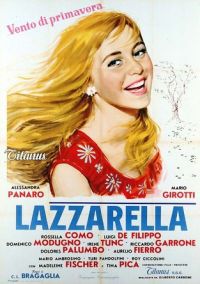| Lazzarella | |
|---|---|
 | |
| Directed by | Carlo Ludovico Bragaglia |
| Screenplay by | Riccardo Pazzaglia Giorgio Prosperi Ugo Guerra |
| Story by | Riccardo Pazzaglia |
| Starring | Alessandra Panaro Terence Hill |
| Cinematography | Raffaele Masciocchi |
| Edited by | Mario Serandrei |
| Music by | Carlo Rustichelli |
| Distributed by | Titanus |
Release date |
|
| Language | Italian |
Lazzarella is a 1957 Italian comedy film directed by Carlo Ludovico Bragaglia and starring Alessandra Panaro and Mario Girotti (later best known as Terence Hill). It is loosely inspired by the lyrics of the song "Lazzarella" by Riccardo Pazzaglia and Domenico Modugno, with the same Pazzaglia serving as a screenwriter. [1] The film was a box office success, being the tenth most viewed film in the 1957/58 season in Italy. [2]